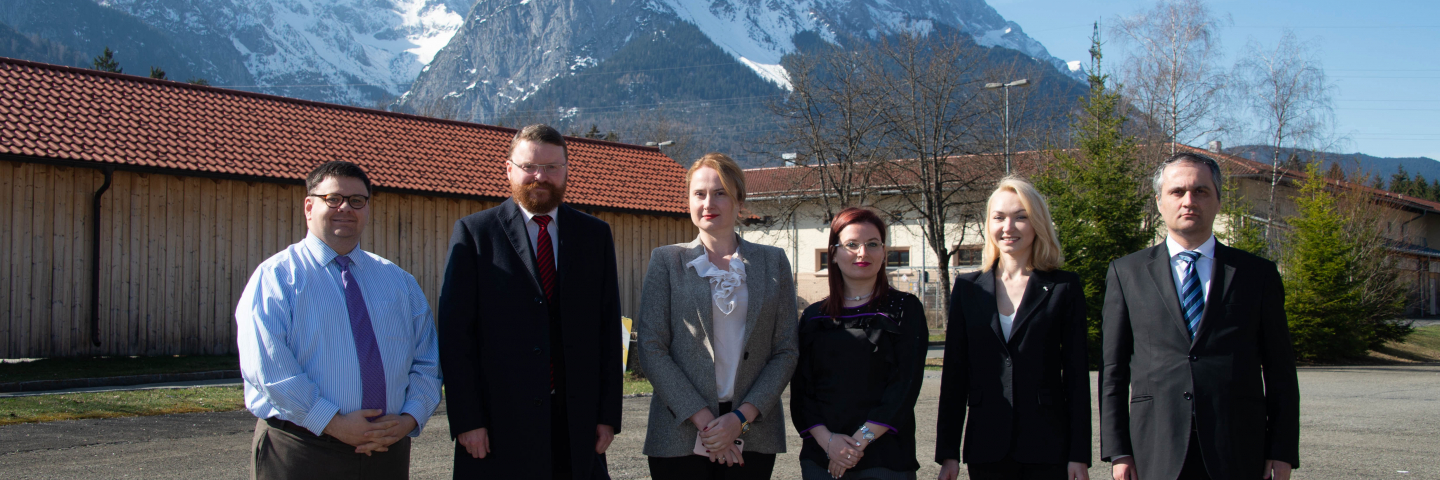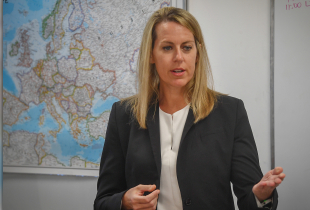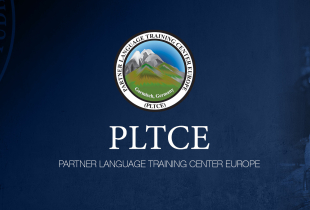
Marshall Center Course Teaches Diplomats Nuances of the English Language
By Christine June
Public Affairs Office
George C. Marshall European Center for Security Studies
GARMISCH-PARTENKIRCHEN, Germany (April 8, 2019) – Erta Dunga’s everyday job is to help her country, the Republic of Albania, build relationships with neighboring countries, to include the Western Balkans and further.
“Since I don’t actually have the luxury to know each of the languages of these countries that I cover, the English language is very important for me in my everyday job,” said Dunga, who is the desk officer for the Department of Bilateral Relationships, covering regional and neighboring countries, at the Albanian Ministry of Foreign Affairs.
Dunga and four other diplomats from Republic of Georgia and Ukraine have been attending the Partner Language Training Center Europe’s Language for Diplomacy Course for almost three weeks. They will graduate April 11 at the George C. Marshall European Center for Security Studies here.
Language for Diplomacy focuses solely on diplomats from Eastern European countries who have an advanced level of proficiency in English. This course began March 25.
The central aim of the course is to polish participants’ English language skills to an executive level, with a view toward preparing them to interact in English in professional settings with both confidence and accuracy, said Thomas Soule, who has taught the Language for Diplomacy Course five times.
“I can’t stress enough the importance of this course for me because English is the language of international affairs and every diplomat around the world needs to speak and write in English,” said Ivane Gutashvili, second secretary for the political department of Georgia’s Ministry of Foreign Affairs.
“I write talking points about Georgia’s democratic reforms and other documents in English very often in my job, but I do not have a lot of opportunity to speak in English,” he said. “This course was very helpful for me to gain more experience in speaking English.”
He added, “The feedback that I received from native speakers was very helpful because there are some practical details that you just can’t possibly receive from non-native speakers. This will really help me in my job.”
During the three-week course, classroom time was dedicated to improving discussion skills, vocabulary building, and improving writing, particularly summary and analysis.
“To some extent, participants are learning the technical language of diplomacy in this course, but it’s more about learning the nuances of the English language,” Soule said.
“For example,” he explained, “after we listen to a speech or read an article, we discuss how the author or speaker used the English language and to what effect, rather than, what do the words mean or what grammar is being used. It’s a higher degree of understanding nuances, such as rhetorical and persuasive features.”
Participants are taught strategic communication skills such as framing an argument, crafting and delivering a message, how to do presentations, negotiations and panel discussions, and verbal briefs on policy. They also receive media training.
Soule added that they learn how to analyze based on data and synthesizing information from various sources and professional terminology for defense, security and diplomacy.
To bring all these lessons together, the participants experience what it’s like to be a member of a professional conference during the course’s mock panel discussion.
“This panel discussion tests what they have learned during these three weeks from writing and giving opening statements, to being able to quick think in English as they take questions from the audience,” Soule said. “The ideas is for them to be on a panel together talking about a common theme.”
For this class, the theme was “Challenges and Opportunities Facing the European Union.” Soule said all the articles and videos were based on this theme.
Inside and outside the classroom, participants attended lectures and discussions on foreign affairs and security topics with Marshall Center faculty in order to prepare them for settings such as professional conferences and multilateral meetings, where they will be expected to communicate in English at a very high level.
“We are fortunate that while the diplomats are here, we are able to go visit plenary sessions of whatever resident course is being offered at the Marshall Center at the time,” Soule said. “After these plenary sessions, we do review new or advance vocabulary, but we also dissect how the speaker was getting his or her point across through word choice and structure, body language and eye contact.”
One of the Marshall Center’s transnational resident programs, the Program on Terrorism and Security Studies was offered while these diplomats were here. They were also able to observe plenary lectures during PTSS 19-07. Topics of these lectures were the military’s role in counterterrorism, the role of intelligence in counterterrorism and hostage negotiations.
“These topics were relevant and definitely applied to my country and region, and I got to see it from a diplomatic point of view and was able to get a lot of information,” Dunga said, “Also, it was really good for me to practice the things we had learned so far in class, such as how language applies to different topics and how you have to take into consideration how to use the main words, as well as the presentation techniques.”
She added that she was looking forward to meeting and discussing with the two participants from Albania, who work in the Ministry of Defense. “I will be able to gain a different perspective, which I think will be very useful to me in my daily work.”
These diplomats are now a part of the Marshall Center’s alumni network, which has more than 13,300 security professionals from 155 nations. Out of that number, there are now 60 Language for Diplomacy alumni from four countries.
This course came about during a visit of the Kosovo Diplomatic Academy staff at the Marshall Center in December 2014. In the following July, the Marshall Center held its first Language for Diplomats for six members of the Republic of Kosovo’s Ministry of Foreign Affairs.
The second course, which was held in 2016, was also only for diplomats from Kosovo, but in 2017, PLTCE began having the course twice a year and opened it up to participants from Georgia, Ukraine and Albania.
Marshall Center’s Partner Language Training Center Europe will hold another Language for Diplomacy Course in the autumn.
“I think it’s very important that there are diplomats from the countries that are on their way to transform their countries in terms of democratic reforms,” said Gutashvilli, talking about his classmates. “We were able to discuss problems and share our ideas about democracy and democratic reforms, and I think this was

